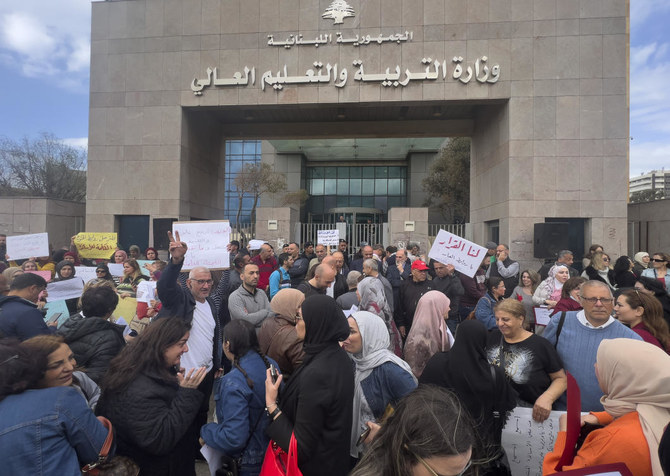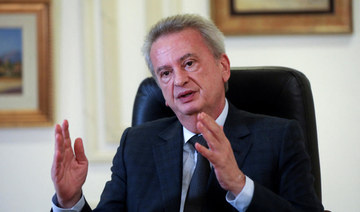BEIRUT: On a recent school day, the Rene Mouawad High School in Beirut was empty, its classrooms dark, just like all of Lebanon’s public schools have been for most of the past three months. Its striking teachers were protesting in front of the Education Ministry, not far away.
About 100 teachers joined the demonstration outside the ministry, blocking traffic and holding placards demanding pay raises. “We are done with charity,” said Nisreen Chahine, the head of the union for contractor teachers. “We are not negotiating anymore. They should either rightfully pay or us or go home.”
The teachers gave speeches demanding officials come out and talk to them. But as usual in these regular protests, no one from the ministry emerged. After several hours, the teachers packed up and went home.
Lebanon’s schools are crumbling under the weight of the country’s economic collapse as the political leadership — which caused the crisis through decades of corruption and mismanagement — balks at taking any measures to resolve it. Since the meltdown began in late 2019, over three-quarters of Lebanon’s 6 million people have been plunged into poverty, their assets evaporating as the currency’s value shrivels and inflation rises at one of the world’s highest rates.
Most of the country’s children have not been in school for months — many since even before teachers, who say they can no longer live on their salaries, went on strike in December. Lebanon was once known for producing a highly skilled, educated work force. But now an entire generation is missing out on schooling, wreaking long-term damage on prospects for the country’s economy and future,
Teachers called their strike because their salaries, in Lebanese pounds, have became too low to cover rent and other basic expenses. The pound has gone from 1,500 to the dollar before the crisis to 100,000 to the dollar currently. Most teachers are now paid the equivalent of about $1 an hour, even after several raises since 2019. Grocery stores and other businesses now usually price their goods in dollars.
Teachers are demanding adjusted salaries, a transportation stipend, and health benefits. The government only offered to partially cover transportation, saying it didn’t have the budget for more. Though schools partially reopened last week after some teachers returned to work, most chose to continue striking.
Even before the crisis, Lebanon’s investment in public schools was limited. In 2020, the government’s spending on education was equivalent only to 1.7 percent of Lebanon’s GDP, one of the lowest rates in the world, according to the World Bank. The 2022 budget allocated 3.6 trillion Lebanese lira for education — the equivalent of around $90 million at the time the budget was passed in October, less than half the $182 million budget on education from a donor-funded humanitarian program.
Instead, the government has relied for years on private and charity schools to educate children. Humanitarian agencies paid to cover salaries and keep decrepit infrastructure functioning. Two-thirds of Lebanese children once went to private schools, but hundreds of thousands dropped out in recent years because private schools have had to increase tuition to cover soaring costs. Public and private schools struggle to keep lights on as fuel costs mount.
Even before the strike, more than 700,000 children in Lebanon, many of them Syrian refugees, were not in school because of the economic crisis. With the strike, an additional 500,000 joined their ranks, according to UNICEF.
“It means we now see children ages 10, 12, 14 and they are not able to even write their own names or write basic sentences,” Ettie Higgins, UNICEF deputy representative for Lebanon, told the The Associated Press. UNICEF said that last week it gave almost $14 million to help more than 1,000 public schools pay staff.
Rana Ghalib, a mother of four, said it makes her anxious to see her children at home when they should be in school. Her 14-year-old son had to repeat the 6th grade because he has fallen behind during previous disruptions.
“The classrooms are basically empty because teachers are demanding their rights and they’re dark because there is no fuel,” Ghalib told the AP.
The international community has been pushing Lebanon’s leaders to carry out wide-ranging reforms in the economy, financial system and governance in order to receive a $3 billion bailout package from the International Monetary Fund and unlock development aid. The political elite, which has run the country since 1990, has stalled — because, critics say, reforms would undermine its grip on power and wealth. Amid political deadlock, there hasn’t been a president for months, and the government only functions in a limited caretaker capacity.
Education, meanwhile, is joining banks, medicine and electricity in the ranks of Lebanon’s failing institutions. That could cause long-term damage: Lebanon has traditionally relied on its educated and skilled diaspora population abroad to send remittances back home to support families, invest and feed dollars into the banking system. The exodus of skilled people skyrocketed during the economic crisis, leaving remittances as Lebanon’s last economic lifeline.
Hussein Cheaito, an economist and nonresident fellow at The Tahrir Institute for Middle East Policy, a Washington-based think tank, says the crippled education system will further “deteriorate the social fabric” of Lebanon and deepen poverty.
“This will have a effect on the longer-term growth of the economy,” he told the AP. “This means there will be less access to jobs in the future … (and) weaken the labor market in general.”
Ghalib, meanwhile, checks on her children, who are watching TV and playing with their cellphones at a time when they would usually be studying. Even her 9-year-old daughter is aware that her future is in jeopardy, she said.
“My youngest daughter tells me, ‘I want to be a doctor, but how can I do that if I’m sitting at home?’” Ghalib said. “I don’t know what to tell her.”
Lebanon’s empty schools bode long-term damage from crisis
https://arab.news/b6u75
Lebanon’s empty schools bode long-term damage from crisis

- About 100 teachers joined demonstrations outside the ministry, blocking traffic and holding placards demanding pay raises
- Lebanon’s schools are crumbling under the weight of the country’s economic collapse
Israeli defense minister to visit Pentagon: US

- In a formal response this week the Palestinian militant group Hamas stopped short of accepting the plan, making counter-proposals on several points
WASHINGTON: Israeli Defense Miniter Yoav Gallant will visit Washington soon for talks with his US counterpart, the Pentagon said Saturday as the war in Gaza rages on.
President Joe Biden’s administration is pressing for a ceasefire deal which it says is backed by Prime Minister Benjamin Netanyahu but has drawn fury from some of the Israeli leader’s far-right allies.
In a formal response this week the Palestinian militant group Hamas stopped short of accepting the plan, making counter-proposals on several points.
In a call Tuesday with Defense Secretary Lloyd Austin, Gallant accepted an invitation to visit the Pentagon, press secretary Major General Patrick Ryder said in a statement.
The date of the visit has yet to be determined and the aim of the meeting is to “further discuss ongoing security developments in the Middle East,” Ryder said on the social media platform X, formerly Twitter.
Qatar and Egypt plan talks with Hamas on Gaza ceasefire: White House

- Sullivan said he had spoken briefly to one of the main interlocutors, Qatar’s Prime Minister Sheikh Mohammed bin Abdulrahman Al Thani, and that they would speak again about Gaza on Sunday while both are in Switzerland for the Ukraine conference
BUERGENSTOCK, Switzerland: White House national security adviser Jake Sullivan said on Saturday that mediators for Qatar and Egypt plan to engage Hamas militants soon to see if there is a way to push ahead with a Gaza ceasefire proposal offered by US President Joe Biden.
Sullivan spoke to reporters on the sidelines of a Ukraine peace summit and was asked about diplomatic efforts to get an agreement for Hamas to release some hostages held since Oct. 7 in exchange for a ceasefire lasting at least six weeks.
Sullivan said he had spoken briefly to one of the main interlocutors, Qatar’s Prime Minister Sheikh Mohammed bin Abdulrahman Al Thani, and that they would speak again about Gaza on Sunday while both are in Switzerland for the Ukraine conference.
Hamas has welcomed the ceasefire proposal, but insists any agreement must secure an end to the war, a demand Israel still rejects. Israel described Hamas’s response to the new US peace proposal as total rejection.
Sullivan said that US officials have taken a close look at Hamas’s response.
“We think some of the edits are not unexpected and can be managed. Some of them are inconsistent both with what President Biden laid out and what the UN Security Council endorsed. And we are having to deal with that reality,” he said.
He said US officials believe there remains an avenue to an agreement and that the next step will be for Qatari and Egyptian mediators to talk to Hamas and “go through what can be worked with and what really can’t be worked with.”
“We anticipate a back-and-forth between the mediators and Hamas. We’ll see where we stand at that point. We will keep consulting with the Israelis and then hopefully at some point next week we’ll be able to report to you where we think things stand and what we see as being the next step to try to bring this to closure,” he said.
Beirut airport busy with Eid visitors despite tense security situation

- Motorcyclist killed in Israeli drone strike as Hezbollah keeps up retaliatory attacks
- Festival brings challenges for Lebanese forced to flee their homes
BEIRUT: Beirut’s Rafic Hariri International Airport witnessed an influx of arrivals on Saturday as Lebanese expatriates and tourists ignored the hostilities in the south and traveled to celebrate the Eid Al-Adha holiday.
European embassies had earlier issued warnings against visiting Lebanon because of the tense security situation, but these failed to deter expatriates and visitors, mainly from Iraq and Egypt, arriving for Eid.
On the eve of the holiday, there was a noticeable discrepancy in the prices of sacrificial animals in the Lebanese market, along with an unjustified increase in meat prices.
Majed Eid, secretary of the Syndicate of Butchers, Importers, and Traders of Live Livestock, said that imports of sacrificial animals from abroad had fallen this year compared with previous years.
The security situation in the Tyre area has led to reduced shopping activities as Eid approaches, despite the substantial influx of expatriates who typically boost commercial and economic activity there.
Tyre Traders Association Secretary Ghazwan Halawani said that the preparations for Eid seemed ordinary, with no noticeable improvement in commercial activity, sales, or market visitors.
He attributed the decline to anxiety over military operations on the border and Israeli attacks on civilians.
On the eve of Eid Al-Adha, thousands of families from the southern region headed to their villages near the border despite the hostilities.
Issa, a butcher, planned to spend the holiday with his family, even though his area had been sporadically shelled in the past few months.
“Nothing will happen to us except what God has destined for us,” he said.
The Eid holiday will be challenging for the people of the south, especially those who fled their villages eight months ago.
Eid Al-Adha presents significant challenges for the displaced southerners, with almost 100,000 people forced to leave their villages.
Nabatieh Gov. Hwaida Turk told Arab News that 65 towns in Nabatieh Governorate had been subjected to “systematic shelling and fires due to Israeli attacks.”
Some towns were almost destroyed, she said.
Turk said that residents of the front-line towns, especially in the Marjayoun and Hasbaya areas, did not return for Eid.
However, villages and towns to the rear are crowded with displaced people alongside their original inhabitants.
She said the people in the southern region tried to celebrate Eid with hope despite the difficult economic conditions.
Hezbollah kept up retaliatory attacks on Israel on Saturday, days after an airstrike killed one of its commanders.
Aerial attacks on both sides escalated, with Hezbollah saying that it carried out an attack “with a fleet of suicide drones on the Khirbet Maer base, destroying part of it.”
The attack was in response to the killing of a senior Hezbollah commander, Sami Hassan Taleb, nicknamed Abu Taleb, along with three others, in an Israeli attack on their location in Jouaiyya several days ago.
Israeli Army Radio reported that a fire erupted in the Goren settlement in western Galilee after several Hezbollah drones struck the area.
As part of the escalation, Hezbollah targeted the headquarters of the air surveillance and operations management unit at the Meron base.
Israeli media outlets said that “two anti-armor missiles launched from the Meron base were targeted.”
Hezbollah said that it struck a group of Israeli soldiers at the Hadab Yaron site with a missile, killing or injuring several.
An Israeli military drone strike early on Saturday killed a motorcyclist at the Bint Jbeil–Maroun Ras intersection. Another person was injured in the resulting fire.
The outskirts of Deir Mimas and the Aaziyyeh Hill were subject to phosphorus shelling, causing fires to erupt in forests.
Israeli army spokesperson Avichay Adraee claimed that “an air force plane targeted a Hezbollah vandal in Aitaroun,” adding that “the Israeli army shelled the area with artillery.”
Palestinian teenager killed in West Bank raid

- Israel has killed at least 37,296 Palestinians in Gaza, mostly civilians, according to the territory’s health ministry
RAMALLAH: The Palestinian Health Ministry said Israeli troops shot dead a Palestinian teenager in the occupied West Bank on Saturday, as an army official confirmed troops opened fire during a raid.
Sultan Abdul Rahman Khatatbeh, 16, was killed by Israeli fire in the northern West Bank town of Beit Furik, the ministry said in a statement published on Facebook.
Palestinian news agency Wafa reported that two others were injured when Israeli forces stormed the town east of Nablus, “firing live bullets at local residents.”
HIGHLIGHTS
• Sultan Abdul Rahman Khatatbeh, 16, was killed by Israeli fire in the northern West Bank town of Beit Furik.
• Two others were injured when Israeli forces stormed the town east of Nablus, ‘firing live bullets at local residents.’
An Israeli military official said that troops were operating in the Nablus area when “dozens of suspects hurled rocks at Israeli security forces, who responded with riot dispersal means and live fire.”
“Hits were identified,” the official said.
The West Bank, which Israel has occupied since 1967, has seen a surge in violence for more than a year, particularly since the Israel-Hamas war in Gaza erupted on Oct. 7.
At least 546 Palestinians have been killed in the territory by Israeli troops or settlers since the Gaza war broke out, according to Palestinian officials.
At least 37,296 Palestinians have been killed in Israel’s military campaign, according to the Gaza Health Ministry.
Also on Saturday, the armed wing of Palestinian Islamic Jihad said the only way to return Israeli hostages is through Israel’s withdrawal from Gaza, ending its offensive and reaching a deal for exchanging Israeli hostages for Palestinian prisoners.
The spokesman of Al-Quds Brigades, the armed wing of the Palestinian group, made the remarks in a video posted on Telegram.
‘Miscalculation’ could lead to wider Hezbollah-Israel conflict, say UN officials

- “The danger of miscalculation leading to a sudden and wider conflict is very real,” the two officials said
- The United States and France are working on a negotiated settlement to the hostilities along Lebanon’s southern border
BEIRUT: There is a “very real” risk that a miscalculation along Lebanon’s southern border could trigger a wider conflict between Hezbollah and the Israeli military, two UN officials in Lebanon warned on Saturday.
The United Nations special coordinator for Lebanon, Jeanine Hennis-Plasschaert, and the head of UN peacekeeping forces in Lebanon, Aroldo Lazaro, said they were “deeply concerned” about the recent escalation along Lebanon’s border.
Iran-backed Hezbollah last week launched the largest volleys of rockets and drones yet in the eight months it has been exchanging fire with the Israeli military, in parallel with the Gaza war.
“The danger of miscalculation leading to a sudden and wider conflict is very real,” the two officials said in a written statement on Saturday.
The United States and France are working on a negotiated settlement to the hostilities along Lebanon’s southern border. Hezbollah says it will not halt fire unless Israel’s military offensive on Gaza stops.




















